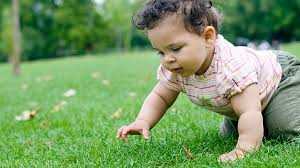Constipation can be uncomfortable for babies. Solutions Offer water after 6 months Give fruits like prunes or papaya Do bicycle leg exercises
When Do Babies Start Crawling?
Crawling usually begins between 7 and 10 months. How to Encourage Place toys slightly out of reach Provide safe floor space Avoid using baby walkers
Pear for Babies: Benefits and Tips
Pear helps relieve constipation in babies. Benefits High water content Soft texture
Baby Massage: A Complete Guide
Baby massage promotes relaxation, better sleep, and bonding. Benefits Improves circulation Relieves colic and gas Encourages deeper sleep Strengthens parent–baby bonding
Baby Spit-Up: What to Do
Spit-ups are common and usually harmless. Prevention Keep baby upright 20–30 minutes after feeding Offer smaller, more frequent feeds When to Consult If vomiting is forceful, bloody, or causes poor weight gain.
Calcium in Baby’s Diet
Calcium is vital for bones and teeth. Sources Dairy products Green vegetables Sesame seeds Tip Calcium absorption is improved when combined with vitamin D.
Motor Development Stages in Babies
Motor development follows key milestones. 4–6 Months Rolls over Grasps objects 7–9 Months Sits without support Begins crawling 10–12 Months Stands up Takes first steps
Fever in Babies: When to Worry
Fever in babies requires special attention. What to Do Check temperature regularly Dress in light clothing Ensure frequent hydration When to Consult Before 3 months: at 38 °C (100.4 °F) or higher.After 3 months: at 39 °C (102.2 °F) or higher, or if other symptoms are present.
Why Are Babies Afraid of Strangers?
Some babies show fear of strangers around 8–9 months. Tips Allow gradual approach Don’t force interaction Offer familiar objects for comfort
Orange in Baby’s Diet: Precautions
Orange is rich in vitamin C but may be acidic. Tips Offer diluted juice without sugar Avoid excess to prevent stomach irritation


